新编大学基础英语综合教程4教案unit 5
新标准大学英语综合教程4-unit5教案
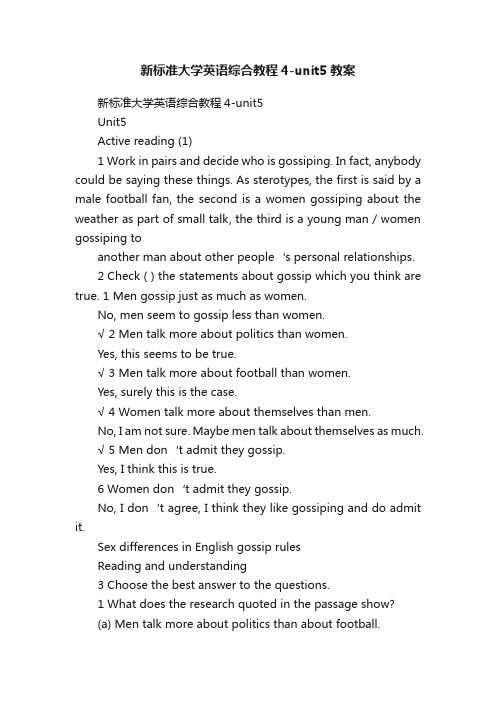
新标准大学英语综合教程4-unit5教案新标准大学英语综合教程4-unit5Unit5Active reading (1)1 Work in pairs and decide who is gossiping. In fact, anybody could be saying these things. As sterotypes, the first is said by a male football fan, the second is a women gossiping about the weather as part of small talk, the third is a young man / women gossiping toanother man about other people‘s personal relationships.2 Check ( ) the statements about gossip which you think are true. 1 Men gossip just as much as women.No, men seem to gossip less than women.√ 2 Men talk more about politics than women.Yes, this seems to be true.√ 3 Men talk more about football than women.Yes, surely this is the case.√ 4 Women talk mo re about themselves than men.No, I am not sure. Maybe men talk about themselves as much.√ 5 Men don‘t admit they gossip.Yes, I think this is true.6 Women don‘t admit they gossip.No, I don‘t agree, I think they like gossiping and do admit it.Sex differences in English gossip rulesReading and understanding3 Choose the best answer to the questions.1 What does the research quoted in the passage show?(a) Men talk more about politics than about football.(b) Women don‘t like speaking about politics and art. (c) Men gossip just as much as women.(d) Men and women gossip in exactly the same way.2 What do men do when women are present?(a) They tend to talk about themselves.(b) They change their tone of voice. (c) They speak more about politics and art than usual.(d) They let women do most of the speaking.3 What is the main difference between male and female gossip? (a) Women don‘t realize they are gossiping.(b) Men only gossip outdoors.(c) Women speak more about themselves than men do. (d) Men speak more about themselves than women do.4 What is ―the tone rule‖ in women‘s gossip? (a) Use a special tone of voice to show that you are gossiping. (b) It is important to keep a flat unemotional tone.(c) Don‘t change your tone of voice when you start gossiping. (d) Always start gossiping by using a low whisper.5 What is ―the detail rule‖?(a) You should avoid boring details when you gossip.(b) When gossiping about people it‘s important to quote what they actually said.(c) You should avoid talking about why people did something.(d) It doesn‘t matter if your gossip is vague.6 What does ―the feedback rule‖ say about listeners?(a) They should keep quiet while someone is gossiping.(b) They shouldn‘t show surprise.(c) They should believe everything they hear. (d) They should show interest and enthusiasm.4 Number the different parts of the passage in the order inwhich they occur.1 Refer to recent research to dispel the myth about male gossip.2 Reveal that men change topic of conversation when women are present.3 Focus on the difference of content between male and female gossip.4 Suggest that the myth about male gossip is really a problem of terminology.5 Present a detailed, technical account of how women gossip.6 Conclude that the vital difference between male and female gossip lies in the positive response of the audience.Dealing with unfamiliar words5 Match the words in the box with their definitions.1 in a way that is impossible to doubt and easy to see (decidedly)2 the reason that you do something (motive)3 main, or most important (principal)4 with qualities thought to be typical of men (masculine)5 to criticize something, or to suggest it is not good enough for you (sniff)6 lively or active (animated)6 Complete the paragraph with the correct form of the words in Activity 5.When Simona Ventura became the host of the Italian TV soccer programme, a lot of people (1) sniffedat the decision. What could a woman do in such a (2) decidedly male-dominated world? They argued.But the (3) motive behind the choice of Simona as the new presenter soon became apparent. Ratherthan change to fit the programme –there is nothing (4) masculine about her – she created a new, moremodern show, the (5) principal aim of which is to entertain the whole family. The old style, lengthy andrather technical analyses of football matches, has been replaced by a lively TV programme, which is(6) animated by guest celebrities, dancers and singers, as well as extracts from the day‘s top matches.7 Replace the underlined words with the correct form of the following words. You may need to makeother changes.1 Cultural and intellectual programmes tend to be broadcast very late in the evening. (highbrow)2 At the beginning I was very shy, but I soon got to know everyone and made friends. (initially)3 The course I enjoyed most when I was studying linguistics was the one on the relationship betweenwords and meanings. (semantics)4 To find out more about English as a world language, we need reliable people who are able to giveinformation. (informants)5 She sent me a bunch of roses when I got the job, and I did the same when she got promoted. (reciprocated)6 For some men there is still a feeling of embarrassment and unease about taking orders from a femalesuperior. (stigma)7 After the goal was disallowed, most of the words I could hear were swear words. (expletives)8 You can‘t speak like that to someone you don‘t know. It‘s a matter of rules of social behaviour. (etiquette)9 Only after a very careful and time-consuming editing will this book be ready for publication. (exhaustive)8 Answer the questions about the words and expressions.1 Does scandalous behaviour (a) make you feel uncomfortable, or (b) leave you indifferent?2 If you bemoan something, do you (a) express pleasure, or(b) complain about it?3 If you rake over something, do you (a) want to forget it, or(b) keep talking about it?4 If you are appreciative of something someone has done for you, do you (a) thank them, or (b) criticizethem?5 If a man has an effeminate manner, does he make you think of (a) a child, or (b) a woman?6 Is camp behaviour (a) typical of, or (b) different from established norms about the traditional male wayof doing things?Reading and interpreting9 Check ( ) the writer‘s main purposes in writing the passage. √ 1 to summarize findings from recent research Most of the passage is taken up with research findings from both the writer and others. If you arenot sure about this, look at how many times words like study, research, paragraph five and see how verbs in the past tense in the second part are all reporting research findings!2 to present the writer‘s own research findingsThese are clearly included and they are most of the second part, but thisis the main purpose is notto present them – they illustrate how gossip works.3 to dispel a myth about males and gossipT he first part of the text does this, but the second part reports research only about women‘s gossip, so No 1 is a better answer.4 to show that women are superior to menNo, the writer does not intend to show this and doesn‘t do so. 5 to encourage people t o learn to gossip properly No, the passage is about rules, but these are not the kind that people are supposed to learn but the descriptive rules that describe common behaviour. There is nothing about encouraging people to behave like this.6 to draw attention to the different ways in which men and women gossip This is a reasonable answer but the passage is really reporting research (see No 1)7 to analyze the way in which women gossip This is the point of the second part, but not the main idea of the whole passage.Active reading (2)Marked: women in the workplaceReading and understanding3 Choose the best summary of the passage.1 The English language reflects and reinforces the sexist attitudes of society, whether we consider wordssuch as actress, which is a less serious equivalent of the word actor, or titles we give women, such asMrs, Miss and Ms.This only summarizes the first section, but the title should indicate that a summary would say more thanthis, including the points about hairstyle or clothes.2 Women find it much harder to get on in the workplace because they haveto spend too much timethinking about what clothes to wear, or what hairstyle they should have. This is only one point. It doesn‘t summaraize the main idea and examples of language use.3 Women constantly have to make choices about dress and appearance, and even the way they sign their names, which lead people to make judgments about them; men do not have to make the same choices.Although this doesn‘t emphasize l anguage, it summarizes the main idea of choice (marked / unmarked).4 Choose the best answer to the questions.1 Which of the following words is marked?(a) Doctor. (b) Actor. (c) Actress. (d) Poet.2 What does a marked female ending to a word usually convey? (a) Physical attractiveness.(b) A lack of authority. (c) A lack of seriousness.(d) Greater professional competence.3 What did the writer notice at a conference?(a) All the women were dressed in the same way. (b) All the men were dressed in the same way.(c) One of the men wore a cowboy shirt and jeans.(d) None of the women wore sensible shoes.4 What did a woman with high heels do at the conference?(a) She was isolated by her female colleagues.(b) She was the first to complete a group task.(c) She broke one of the heels when she had to make a trek.(d) She took off her shoes and attracted a group of men.5 What did a male colleague tell a female lawyer to do before she went to court?(a) To put on a jacket over her blouse. (b) To do up a buttonon her blouse.(c) T o undo a button on her blouse.(d) To wear something with darker colours.6 What is a woman often asked to do when filling in a form?(a) Choose from four titles.(b) Give both her married and unmarried name. (c) Give information about her married status.(d) Avoid using the title ―Dr‖.Dealing with unfamiliar words5 Match the words in the box with their definitions.1 the place where you work (workplace)2 to mean something (denote)3 to make something or someone become gradually less effective, confident, or successful (undermine)4 to think that something is true because it is likely, although you cannot be certain (presume)5 a regular and important part or feature of something (staple)6 involving or consisting of many people, things, or parts (multiple)7 expressing what you mean using clear and effective language (eloquent)8 used to describe a word that refers to one person or thing (singular)9 behaving in a very unfriendly or threatening way towards someone (hostile)10 to say or write words that someone else has said or written (quote) 11 to give someone responsibility for an important job or activity (entrust)6 Complete the sentences with the correct form of the wordsin Activity 5.1 Melanie got to her feet and made a eloquent defence of the rights of women in the workplace.2 There are a number of words in English, such as people, which although technically in the singularform, in actual fact denote a plural meaning.3 The dark suit is a staple of the businessman‘s wardrobe, and I presume it will remain so for a long time.4 The hostile reception he got at the meeting is likely to undermine all the work that has been donerecently to improve relations between staff and management.5 Jason suffered multiple injuries in the acc ident, and we didn‘t want to entrust an inexperienced surgeonwith the operation.6 I think that most world leaders in the next century will be women, but don‘t quote me on that.7 Replace the underlined words with the correct form of the following words. You may need to makeother changes.1 Don‘t forget to put on a bit of lipstick and mascara before you go out. (make-up)2 The candidate displayed a lack of seriousness which we felt was not appropriate to the position he wasapplying for. (frivolousness)3 I need to check my free dates in March before I can confirm whether I shall be able to attend theconference. (availability)4 He has an attractive smile which people find hard to resist. (alluring)5 This list of participants needs to be put into alphabeticalorder. (alphabetized)6 The first person officially suggested as general secretary had to withdraw due to ill health. (nominee)7 After the first remarks offering congratulations the atmosphere at the prize-giving ceremony turned sour. (congratulatory)8 The speaker made a comment which I found unfriendly and which meant the opposite of what he reallymeant. (sarcastic)8 Answer the questions about the words and expressions.1 Is a linguistic problem concerned with (a) words, or (b) figures?2 If you are disqualified from an event, do the organizers (a) allow you, or (b) refuse to allow you to takepart?3 Is rub likely to mean (a) a problem, or (b) a solution?4 If you have got myriad job offers, are you likely to be (a) concerned, or (b) optimistic about your future?5 If you let on about something to someone, do you (a) tell them about it, or (b) keep it a secret?6 If you duck something which has been thrown at you, does it (a) hit, or (b) miss you?7 If someone speaks to you in an uppity way, is their manner(a) superior, or (b) humble and polite?Reading and interpreting9 Answer the questions.1 From which field has the writer borrowed the term marked?The term marked is borrowed from linguistics.2 What are the differences between a ―marked‖ and an ―unmarked‖ word? An ―unmarked‖ word is normal, commonor neutral, while a ―marked‖ one is noticeable or used in a particular way or has a special meaning. Sometimes the unmarked one is positive and the unmarked on is negative.3 What is the difference between a ―marked‖ and an ―unmarked‖ appearance in the workplace?An ―unmarked‖ appearance would be normal, neutral and common, so it is unlikely that anyone wouldcomment o n it. A ―marked‖ appearance would be different, particular and noticeable because it wouldbe a contrast to all those with an unmarked appearance –people would be likely to comment on the person with the marked appearance.4 Why is no make-up ―marked‖ for women?Because many or most women wear some make-up. A woman wearing no make-up in a context where itis expected that make-up would be worn is noticeably different, so it is ―marked‖.5 How often do men wear ―marked‖ clothes in the workplace? Not often or rarely.6 What is the connection between ―marked‖ and ―sexy‖? Assuming that most women wear attractive and smart clothes, say in the workplace, this would be unmarked (among women), whereas if a woman wore sexy clothes (which for example were veryreveal ing), this would be noticeable and ―marked‖ (and inappropriate). In another contex t, the oppositemight be the case, say at a party where most women were dressed in a sexy manner, someone dressedsmartly and conservatively but not in a sexy manner would b e ―marked‖. 7 Why are women‘s titles (Mrs, Miss and Ms) allmarked?Because whichever choice a woman makes it tells people something more than their title: If they choosechoose Miss they are unmarriedbut perhaps also traditional; if they choose Ms, you d on‘t know whether they are married or not, but youdo know that they don‘t want to give information about being married and that they are more modern, liberated, rebellious or feminist. Men do not have to make any of these choices.8 In what sense are wome n‘s surnames marked?In some English-speaking countries, say the US, married woman‘s surname is marked becausetraditionally they take their husband‘s surname as their married surname. So if a woman uses this name,it may signal that she is traditional or willing to adopt her husband‘s identity. Some married women, especially in professions, continue to use their original surname from their own family, and then thisis ―marked‖ –it may be a signal that they are modern, liberated, or wish to keep their own identity. Ofcourse, this is not a problem in Chinese and th ose other languages in which a married woman doesn‘ttake her husband‘s name.Language in usesay + something / nothing / a lot etc about1 Rewrite the sentences using say + something / nothing / a lot etcabout .1 The boots she wears give a lot of information about her. The boots she wears say a lot about her.2 The way he talks about other people gives an indication of his personality.The way he talks about other people says something about his personality. 3 The way she behaves doesn‘t give any indication of her previous career. The way she behaves says nothing about her previous career.4 This statement is very revealing about the organization‘s attitude to women.This statement says a lot abo ut the organization‘s attitude to women. 5 This type of task gives some idea about the structure of the final examination. This type of task says something about the structure of the final examination.on + gerund2 Rewrite the sentences using on + gerund.1 When they checked the figures again, they realized there had been a mistake. On checking the figures again, they realized there had been a mistake.2 When she was asked, she said she would like to be known by her first name. On being asked, she said she would like to be known by her first name.3 When we investigated more completely, we made an important discovery. On investigating more completely, we made an important discovery.4 When they heard the news, most people reacted with offers to help. On hearing the news, most people reacted with offers to help.5 Whe n people are accused of a crime they haven‘t committed, most of them don‘t know how to react.On being accused of a crime they haven‘t committed, most people don‘t know how to react.anything but3 Rewrite the sentences using anything but .1 The organizer of the conference was the opposite of helpful. The organizer of the conference was anything but helpful.2 The instructions you left were certainly not easy to follow. The instructions you left were anything but easy to follow.3 I felt extremely unsafe wearing those four-inch-high heels.I felt anything but safe wearing those four-inch-high heels.4 The weather last week was quite the opposite of warm and sunny. The weather last week was anything but warm and sunny.5 I think that attitudes towards women in the company whereI work are a long way from beingprogressive. I think that attitudes towards women in the company where I work areanything but progressive.other than4 Rewrite the sentences using other than .1 The only thing we do when the three of us meet is gossip. When the three of us meet we do nothing other than gossip.2 Men have no real alternative unless it is to wear a suit. Men have no real alternative other than to wear a suit.3 The only thing I wish to add is to say how much I have enjoyed the whole day.I have nothing to add other than to say how much I have enjoyed the whole day.4 They told her she didn‘t have to do anything except sit quietly and look pretty. They told her she had nothing to do other than to sit quietly and look pretty.5 The only reason I have for being here is the free lunch. I have no reason to be here other than the free lunch.Collocations5 Match the adjectives in Column A with the nouns in Column B.A B bright colours conservative tastes correct tone popular beliefheavy make-up highbrow subject face value6 Complete the sentences with the collocations in Activity 5.1 Both of us have rather conservative tastes, so we‘re unlikely to buy modern furniture.2 I‘m afraid these bonds are worth a lot less than their face value.3 It‘s not easy to find the correct tone in which to speak to new customers.4 I like wearing bright colours; I think they reflect my outgoing personality.5 Yesterday‘s lectur e was on such a highbrow subject that I couldn‘t get interested.6 Why do they put such heavy make-up on people in television studios?7 The popular belief that men don‘t cry is nonsense.7 Translate the paragraphs into Chinese.Women can‘t even fill out a form without telling stories about themselves. Most application form s nowgive four choices for titles. Men have one to choose –―Mr.‖ –so their choice carries no meaning otherthan to say they are male. But women must choose among three, each of them marked. A woman whochecks the box for ―Mrs.‖ or ―Miss‖ communicates not only whether she has been married but also thatshe has conservative tastes in forms of address, and probablyother conservative values as well. Checking ―Ms.‖ declines to let on about marriage (whereas ―Mr.‖ declines nothing since nothing was asked), butit also marks the woman who checks it on her form as either liberated or rebellious, depending on theattitudes and assumptions of the one making the judgment.I sometimes try to duck these variously marked ch oices by giving my title as ―Dr.‖ – and thereby riskmarking myself as either uppity (hence sarcastic responses like ―Excuse me!‖) or an over-achiever (hencereactions of congratulatory surprise, like ―Good for you!‖). (?翻译时注意原文的语气,否则就可能不准确。
全新版大学英语4综合教程Unit5课件

How to read fiction
3. CHARACTERS
The persons who initiate or go through the events of the plot. Their qualities emerge and your understanding of them develops as the story progresses.
Ranking activity 1. What are the determining forces in shaping human nature? genes, family, parenting, schooling, peers, socioeconomic factors… 2. Work in groups to rank these forces in descending order of importance and also explain why. 3. Each group should have a group leader to report the result of the discussion to the class.
Narration
*Definition
*Narrator
*Types of narrators
Narration refers to the way that a story is told, and so belongs to the level of discourse.
A narrator is, within any story , the person who conveys the story to the audience. When the narrator is also a character within the story, he or she is sometimes known as the viewpoint character. The narrator (or the archaic female equivalent, narratress) is one of three entities responsible for story-telling of any kind. The others are the author and the audience; the latter called the "reader" when referring specifically to literature.
大学英语综合教程4unit5课件PPT课件

many here."
"He plays bridge well."
"They generally do. There was a fellow
here last year, oddly enough a namesake of
mine, who was the best bridge player I ever
5
"Do you know Turner?" said Burton as I
nodded a greeting.
"I've met him at the club. I'm told he's a
remittance man."
"Yes, I believe he is. We have a good
name."
6
One day Lenny went to Burton to ask for a job. Bruton told Lenny that if he could successfully swim for three miles, he would gave him a job. Burton knew it would be very difficult for Lenny to make it, Lenny accepted the challenge and drowned.
4
His voice was gentle; you could not imagine that he could possibly raise it in anger; his smile was benign. Here was a man who attracted you because you felt in him a real love for his fellows. At the same time he liked his game of cards and his cocktail, he could tell with point a good and spicy story, and in his youth he had been something of an athlete. He was a rich man and he had made every penny himself. I suppose one thing that made you like him was that he was so small and frail; he aroused your instincts of protection. You felt that he could not bear to hurt a fly.
全新版大学英语综合教程4_Unit5课件

全新版⼤学英语综合教程4_Unit5课件A Friend in NeedFor thirty years now I have been studying my fellowmen.I do not know very much about them.I shrug my shoulders when people tell me that their first impressions of a person are always right.I think they must have small insight or great vanity.For my own part I find that the longer I know people the more they puzzle me.These reflections have occurred to me because I read in this morning?s paper that Edward Hyde Burton had died at Kobe.He was a merchant and he had been in business in Japan for many years.I knew him very little,but he interested me because once he gave me a great surprise.Unless I had heard the story from his own lips,I should never have believed that he was capable of such an action.It was more startling because both in appearance and manner he suggested a very definite type.Here if ever was a man all of a piece.He was a tiny little fellow, not much more than five feet four inheight,and very slender,with white hair,ared face much wrinkled,and blue eyes.Isuppose he was about sixty when I knewhim.He was always neatly and quietlydressed in accordance with his age andstation.Though his offices were in Kobe,Burton often came down to Yokohama.I happened on one occasion to be spending a few days there,waiting for a ship,and I was introduced to him at the British Club.We played bridge together.He played a good game and a generous one. He did not talk very much,either then or later when we were having drinks,but what he said was sensible.He had a quiet,dry humor.He seemed to be popular at the club and afterwards,when he had gone,they described him as one of the best.It happened that we were bothstaying at the Grand Hotel and next day he asked me to dine with him.I met his wife,fat,elderly,and smiling, and his two daughters.It was evidently a united and affectionate family.I think the chief thing that struck me about Burton was his kindliness.There was something very pleasing in his mild blue eyes.His voice was gentle; you could not imagine that he could possibly raise it in anger;his smile was benign.Here was a man who attracted you because you felt in him a real love for his fellows.At the same time he liked his game of cards andhis cocktail,he could tell with point a good and spicy story,and in his youth he had been something of an athlete.He was a rich man and he had made every penny himself.I suppose one thing that made you like him was that he was so small and frail;he aroused your instincts of protection.You felt that he could not bear to hurt a fly.One afternoon I was sitting in the lounge of the Grand Hotel when Burton came in and seated himself in the chair next to mine.…What do you say to a little drink??He clapped his hands for a boy and ordered two gin fizzes. As the boy brought them a man passed along the street outside and seeing me waved his hand.…Do you know T urner?? said Burton as I nodded a greeting.…I?ve met him at the club. I?mtold he?s a remittance man.?…Yes, I believe he is. We have agood many here.?…He plays bridge well.?…They generally do.There was a fellow here last year, oddly enough a namesake of mine,who was the best bridge player I ever met.I suppose you never came across him in London.Lenny Burton he called himself.I believe he?d belonged to some very good clubs.?…No,I don?t believe I remember the name.?…He was quite a remarkable player.He seemed to have an instinct about the cards.It was uncanny.I used to play with him a lot.He was in Kobe for some time.?Burton sipped his gin fizz.…It?s rather a funny story,?he said.…He wasn?t a bad chap.I liked him.He was always well-dressed and smart-looking.He was handsome in a way with curly hair and pink-and-white cheeks.Women thought a lot of him. There was no harm in him,you know,he was only wild. Of course he drank too much.Those sort of fellows do.A bit of money used tocome on for him once a quarter andhe made a bit more by card-playing.He won a good deal of mine,I knowthat.?Burton gave a kindly chuckle.I knew from my own experience that he could lose money at bridge with a good grace.He stroked his shaven chin with his thin hand;the veins stood out on it and it was almost transparent.…I suppose that is why he came to me when he went broke,that and the fact that he was a namesake of mine. He came to see me in my office oneday and asked me for a job.I wasrather surprised.?He told me that therewas no more money coming from homeand he wanted to work.I asked himhow old he was.…“Thirty-five,”he said.…“And what have you been doing hitherto?”I asked him.…“Well,nothing very much,”he said.…I couldn?t help laughing.…“I?m afraid I can?t do anything for you just yet,”I said.“Come back and see me in another thirty-five years,and I?ll see what I can do.”…He didn?t move.He went rather pale.He hesitated for a moment and then he told me that he had had bad luck at cards for some time.He hadn?t been willing to stick to bridge,he?d been playing poker,and he?d got trimmed.He hadn?t a penny.He?d pawned everything he had.He couldn?t pay his hotel bill and they wouldn?t give him any more credit.He was down and out.If he couldn?t get something to do he?d have to commit suicide.…I looked at him for a bit.I could see now that he was all to pieces.He?d been drinking more than usual and he looked fifty.The girls wouldn?t have thought so much of him if they?d seen him then.…“Well isn?t there anything you can do except play cards?”I asked him.…“I can swim,”he said.…“Swim!”…I could hardly believe my ears;it seemed such an insane answer to give.…“I swam for my university.”…I got some glimmering of whathe was driving at.I?ve known toomany men who were little tin gods attheir university to be impressed by it.…“I was a pretty good swimmer myself when I was a young man,”I said.…Suddenly I had an idea.?Pausing in his story,Burton turned to me.…Do you know Kobe?? he asked.…No,? I said, …I passed through it once, but I only spent a night there.?…Then you don?t know the Shioya Club.When I was a young man I swam from there round the beacon and landed at the creek of T arumi.It?s over three miles and it?s rather difficult on account of the currents round the beacon.Well,I told my young namesake about it and I said to him that if he?d do it I?d give him a job.…I could see he was rather taken aback.…“You say you?re a swimmer,”I said.…“I?m not in very good condition,”he answered.…I didn?t say anything.I shrugged my shoulders.He looked at me for a moment and then he nodded.…“All right,”he said.“When do you want me to do it?”…I looked at my watch.It was just after ten.…“The swim shouldn?t take you much over an hour and a quarter.I?ll drive round to the creek at half past twelve and meet you.I?ll take you back to the club to dress and then we?ll have lunch together.”…“Done,”he said.…We shook hands.I wished him good luck and he left me.I had a lot of work to do that morning and I only just managed to get to the creek at T arumi at half past twelve.But I needn?t have hurried;he never turned up.?…Did he funk it at the last moment??I asked.…No,he didn?t funk it.He startedall right.But of course he?d ruined hisconstitution by drink and dissipation.The currents round the beacon weremore than he could manage.We didn?tget the body for about three days.?I didn?t say anything for a moment or two.I was a trifle shocked.Then I asked Burton a question.…When you made him that offer of a job,did you know he?d be drowned??He gave a little mild chuckle and he looked at me with those kind and candid blue eyes of his.He rubbed his chin with his hand.…Well,I hadn?t got a vacancy in my office at the moment.?For my own part I find that the longer I know people the more they puzzle me.1. What does “for my own part” mean?It means “as far as I am concerned”.2. Translate this sentence into Chinese.拿我⾃⼰来说,我发现,认识⼀个⼈的时间越长,我就越感到困惑。
全新版大学英语(第二版)综合教程四Unit5AFriendinNeed参考译文

全新版大学英语(第二版)综合教程_第四册_Uni t 5 Never Judgeby Appearances——A Friend in NeedA Friend in Need(by Somerset Maugha m)For thirty yearsnow I have been studyi ng my fellow men. I do not know very much aboutthem. I shrugmy should ers when people tell me that theirfirstimpres sions of a person are always right. I thinkthey must have smallinsigh t or greatvanity. For my own part I find that the longer I know people the more they puzzle me.我阅人至今已经有三十年之久。
我不大了解他们。
人家对我说他们对一个人的初次印象一准不会错的时候,我耸耸肩。
我认为他们必然眼力颇浅,或者自负过高。
就我来说,我发现自己认得越久的人,他们越使我迷惑不解。
//我最老的朋友们,恰恰是我可以说一点也不了解的人。
Thesereflec tions have occurr ed to me becaus e I read in this mornin g's paperthat Edward Hyde Burton had died at Kobe. He was a mercha nt and he had been in busine ss in Japanfor many years. I knew him very little, but he intere stedme becaus e once he gave me a greatsurpri se. Unless I had heardthe storyfrom his own lips, I should neverhave believ ed that he was capabl e of such an action. It was more startl ing becaus e both in appear anceand manner he sugges ted a very defini te type. Here if ever was a man all of a piece. He was a tiny little fellow, not much more than five feet four in height, and very slende r, with whitehair, a red face much wrinkl ed, and blue eyes. I suppos e he was aboutsixtywhen I knew him. He was always neatly and quietl y dresse d in accord ancewith his age and statio n.我产生这些想法是因为看到今天早晨报纸上登载爱德华·海德·勃吞在神户逝世的消息。
最新新编大学英语教案 第四册 Unit5

新编大学英语教案(4)Unit 5 AthletesAims of TeachingMaster the words describing athletes and sportsImprove the students’ abilities of communication and making commentsKey PointsLearn something about athletes and sportsMaster the method of writingMaster the method of readingDiscussing the question whether athletes should be role modelsLearning the high science and technology can promote the development of the performance of sportsMethods of TeachingUsing multi-media teaching equipmentGroup-Discussion(分组讨论――运动员作为公众人物是否应为道德的典范)Analysis of the textTime ArrangementUnit 5 AthletesPart I Preparation1.Some information about the theme:Sports are playing an important role in society. Not only can they ensure the physical fitness of people, but also they can provide entertainment for both the player and the spectator, and even promote friendship between people. With the development of sports, there have appeared lots of sports stars. They become the topic of conversation, and often serve as models of courage and determination. Neverthelss, star athletes’ role in society and their influence on young peoplehave been a controversial topic.2. Can you name any sports?Track and field: high-jump, long-jump, javelin, hurdles, discus, shot put, pole vaulting, long-distance race, marathonTeam sports: basketball, football, volleyball, cricket, and handballOthers: table tennis, badminton, tennis, fencing, snooker, golf, bowling, diving, surfing, skiing, figure skating3. What’s your favorite sport? Why do you like it?4. Which sports star do you admire most? Why?5. Do you know Karl Malone?aerobic 增氧健身法hiking 徒步旅行track dishing 掷飞碟jogging 慢跑Part IIIn-Class Reading : Athletes Should Be Role Models1. Read the new words and point out some important words.2.Give students fifteen minutes to read the passage Athletes Should Be Role Models.3. Look over exercise 1 to get familiar with the text structure.4. Explain some important/difficult sentences:1) If I were deciding whether a basketball player was a positive role model, 这个句子里,动词were用了虚拟语气,而进行时则起强调作用。
新编大学基础英语综合教程4教案unit
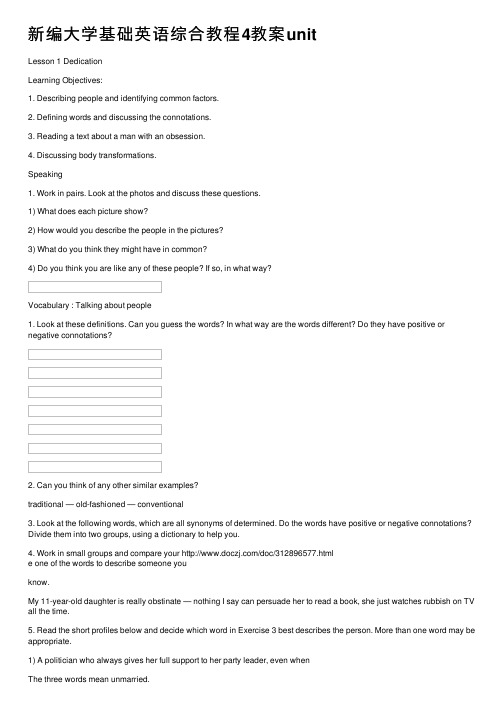
新编⼤学基础英语综合教程4教案unitLesson 1 DedicationLearning Objectives:1. Describing people and identifying common factors.2. Defining words and discussing the connotations.3. Reading a text about a man with an obsession.4. Discussing body transformations.Speaking1. Work in pairs. Look at the photos and discuss these questions.1) What does each picture show?2) How would you describe the people in the pictures?3) What do you think they might have in common?4) Do you think you are like any of these people? If so, in what way?Vocabulary : Talking about people1. Look at these definitions. Can you guess the words? In what way are the words different? Do they have positive or negative connotations?2. Can you think of any other similar examples?traditional — old-fashioned — conventional3. Look at the following words, which are all synonyms of determined. Do the words have positive or negative connotations? Divide them into two groups, using a dictionary to help you.4. Work in small groups and compare your /doc/312896577.htmle one of the words to describe someone youknow.My 11-year-old daughter is really obstinate — nothing I say can persuade her to read a book, she just watches rubbish on TV all the time.5. Read the short profiles below and decide which word in Exercise 3 best describes the person. More than one word may be appropriate.1) A politician who always gives her full support to her party leader, even whenThe three words mean unmarried.Single is used to describe men or women and has a neutral connotation.Bachelor is used to describe a man and has a fairly neutralSpinster is used to describe a woman and is an old-fashioned (often disapproving)term with the implication that the woman will never marry. Its connotation isnegative.Traditional:in accordance with tradition, beliefs and customs; it can have a positive or negative connotation. Compare It is traditional to give chocolate eggs as Easter presents in the UK with He was a very traditional father and they often had arguments.Old-fashioned: not modern, a person who believes in out-dated ideas and customs; it has a negative connotation. Conventional: following conventions or norms; it can have a negative connotation: He holds very conventional views on politics. It may also have a neutral connotation, e.g. My new car is a very conventional design.Positive: resolute, unwavering, dedicatedNegative: stubborn, wilful, obstinate, dogged( single-minded, strong-willed and persistent are dependent on context.)she does not agree with all the party’s policies unwavering2) An employee who works day and night to get a promotion, even though it will probablybe given to someone else. dogged/determined/persistent3) A woman who has recovered from cancer three times strong-willed/resolute4) A man who has failed his driving test ten times and is to take his test againnext month.determined/persistent5) A child who refuses to wear blue trousers today. stubborn/wilful6) A president defending his club, which refuses membership to women. obstinate7) A girl who devotes all her free time to tennis practice and has no social lifeas a result. single-minded8) A single-parent father working, studying and bringing up two children.resolute/determinedSpeaking & Reading: Lexical preparation(1) go by sth.: to be guided by sth.; to form an opinion from sth.e.g. That ’s a good rule to go by.2) lose count (of sth.): to forget the total of sth. before you have finishedcounting ite.g. She had lost count of the number of times she ’d told him to becareful.Speaking & Reading1. Work in pairs. Make a list of the different ways that people typically chooseto change their bodies.2. You are going to read an article about a man called Stalking Cat. What changesdo you think he has made to his body?3. Read the article and check your ideas.4. Read the text again and decide if these statements are true (T) of false (F).If false, explain why.(1) Plastic surgery is still relatively unusual. FIt is now commonplace2) Dennis Avner can ’t remember how many changes have been made to his body.T3) It is thought that a psychological illness may be the cause of Stalking Cat’s behaviour. T4) Because of the changes to his body, Cat is in constant pain. FT he procedures hurt at the time but there is no ongoing pain.5) The procedures Cat has undergone have been carried out illegally. FHe has to have the surgery carried out by a body modification artist because it would be illegal for a medical professional to alter appearance to this extent.6) Cat does not suffer any pain during the operations. FHe cannot have anaesthetic because only qualified doctors can administer it, so the operations are very painful.7) He does not particularly enjoy making the changes to his body. T8) He will probably not make any more changes to his body. FHis goal is to become a perfect cross between a cat and a human, so it is likely he will continue.5. Look again at the adjectives in Vocabulary, Exercise 3. Which would you use to describe Stalking Cat?6. Work in pairs. Discuss these questions.1) Think of someone you know who has made changes to his / her body. Was he / she happy with the results? Why? / Why not?2) In what circumstances would you consider making changes to your body?3) If you could transform yourself into a perfect cross between a human and an animal, which animal would you choose? Why?7. Translate the following sentences into English.1)如果可以依据以往的经验,这个航班会晚点的。
全新版大学英语4综合教程Unit5课件
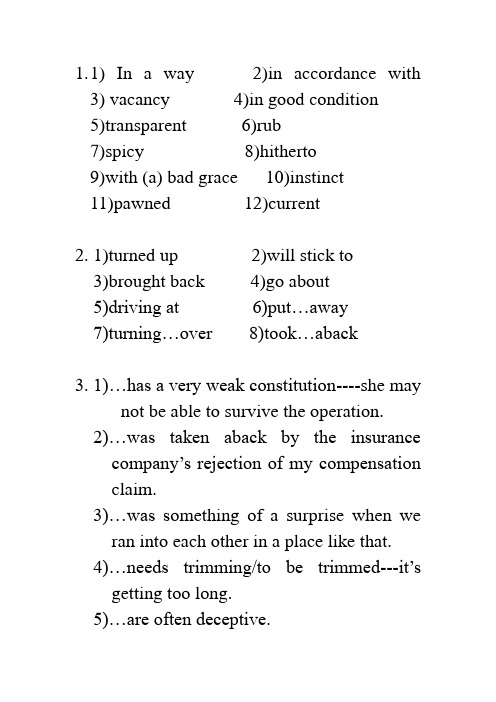
1.1) In a way 2)in accordance with 3) vacancy 4)in good condition5)transparent 6)rub7)spicy 8)hitherto9)with (a) bad grace 10)instinct11)pawned 12)current2. 1)turned up 2)will stick to3)brought back 4)go about5)driving at 6)put…away7)turning…over 8)took…aback3. 1)…has a very weak constitution----she maynot be able to survive the operation. 2)…was taken aback by the insurancecompany’s rejection of my compensationclaim.3)…was s omething of a surprise when weran into each other in a place like that. 4)…needs trimming/to be trimmed---it’sgetting too long.5)…are often deceptive.4. 1) Oddly enough, went broke, wrinkled, hehad gone all to pieces.2)definite, is capable of, her vanity3)too mild, sipping, stroke1)Except for 2)except that3)except 4)except when5)except to 6)except what7)except where 8)except thatV ocabulary SpellingAmE BrE AmE BrEflat favorablecan paralyse candy labourlift meterfaculty catalagueground floor levellingpetrol theatre mail defenserailroad plowtrousers programmetube,practiseundergroundmaize characterise store tireCloze1.insane, current,candid, capable, was taken aback, good condition, constitution, go all to pieces, gone broke, vacancy, mild, deceptive2.suspected, pleading, confirmed, stunned, lucrative, jewellery, wealthy, urge, spell, arrestedTranslation1.I have an instinct that Henry will seek to join the expedition, because he is something of an adventurer.2.H e is capable of sticking to the task at hand, even if he is exposed to noises.3.T he trademark was registered in accordance with the laws hitherto in force.4.O ddly enough, many people volunteered tohelp organize the meeting, but only a few turned up.5.T he teacher’s affectionate words, along with his candid comments, changed the way Mike perceived the society and himself.For my own part, I find that appearances are all too often deceptive. For instance, you might be wrong if you judged by appearances only people like Edward Hyde Burton. In appearance, he seemed a man all of a piece. He was a tiny little fellow with white hair and mild blue eyes, gentle and candid. Nevertheless, he turned out to be very cruel. He insulted and fooled Lenny who was down and out and made him commit himself to an insane venture. What was still more surprising was that he was completely indifferent to Lenny’s death. Without doubt, Burton was a man with a heart of stone.。
大学英语4第五单元教案

*Set forth
Set Set Set Set Set Set Set Set Set
启程、动身( 启程、动身( Line 14) )
about sth. 开始着手做 sth. aside 把某物放到一边 forth sth. 阐明 sth. back 使推迟 sth. apart 留出(作以专用) 留出(作以专用) sth. down 记下 sth. up 建立,成立 建立, off sth. 引爆 sth. out 陈列
22. absent 23. apology 24. soak v.
a. n.
缺席的, 缺席的,不在的 道歉
浸泡,湿透 浸泡,
She soaked the shirt in soapy water. 她把衬衫浸透在肥皂水中。 她把衬衫浸透在肥皂水中。 25.waterproof 25.waterproof 防水的, a. 防水的,不透水的 He promised that it is waterproof. 他向我保证是防水的。 他向我保证是防水的。
3. Tame v. 制服,驯化 制服,
His job is to tame lions. 他的工作是驯狮。 他的工作是驯狮。 a. 温顺的,驯化的 温顺的, He is so tame that he agrees with everybody. 他很随和, 他很随和, 总是顺从他人的意 见。
4. solitude n. 独居,独处 独居, People need a chance to reflect on spiritual matters in solitude. 人们需要独处的机会来反思精神上的事情。 人们需要独处的机会来反思精神上的事情。
26. slippery a. 滑的 A wet road is usually slippery. 潮湿的路往往是滑的。 潮湿的路往往是滑的。 27. choke v. 窒息的说不出话来 She looked like she was going to choke. 她看起来仿佛都要窒息了。 她看起来仿佛都要窒息了。
全新版大学英语综合教程第四册课件Unit5精品文档

1. Language study 2. Ask questions to check their understanding of the text. 3. Text organization
1. Language study
2. Ask questions 源自o check their understanding of the text.
(1). Do you think there is some truth in the saying, “You can’t judge a book by looking at its cover?” and explain. (Before asking the question, teacher may write down the saying on the blackboard and ask students what its meaning is to arouse their interest.)
playing computer games.
Does the narrator think our first impressions of a person are always right? Why or why not?
1. Language study
2. Ask questions to check their understanding of the text.
2. The essays he completed in the latter part of his life are of a piece with his earlier work.
Language Study
wrinkle:
大学英语综合教程4-unit-5-Never-Judge-by-AppearancesPPT课件
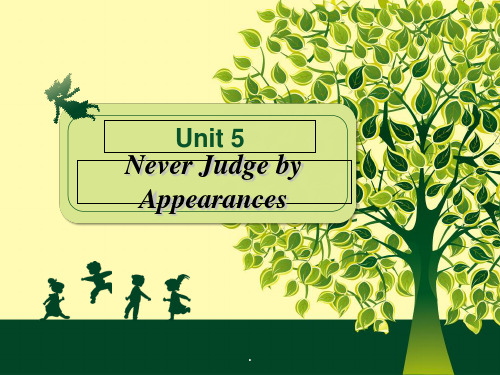
.
19
Cultural background
Bridge 桥牌
Bridge, card game played with 52 cards by four players in two partnerships. Bridge probably originated in the Middle East in the 19th century.
4. Edward Burton was a rich man and he had made every penny himself. T
5. The author was shocked by Burton's kindliness but Burton had done something the author could never have believed he would. T
2. Edward Hyde Burton was a merchant and he had been in business in Japan for many years. T
3. Edward Burton looked like an evil and appeared as if he could hurt anyone, even a fly. F
• Do not value the things you have in your life, but value people you have in your life.
.
7
Brainstorming
As I see it, a good friend should be ________.
Ask them out for lunch or dinner.
新编大学基础英语综合教程4教案unit5
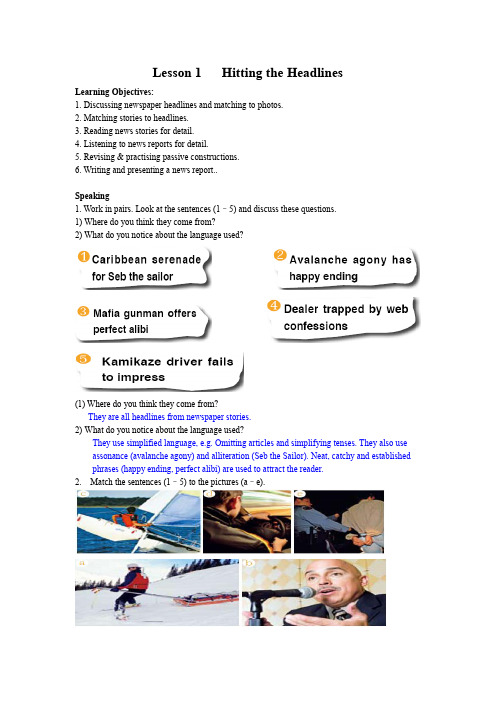
Lesson 1 Hitting the HeadlinesLearning Objectives:1. Discussing newspaper headlines and matching to photos.2. Matching stories to headlines.3. Reading news stories for detail.4. Listening to news reports for detail.5. Revising & practising passive constructions.6. Writing and presenting a news report..Speaking1. Work in pairs. Look at the sentences (1–5) and discuss these questions.1) Where do you think they come from?2) What do you notice about the language used?(1) Where do you think they come from?They are all headlines from newspaper stories.2)What do you notice about the language used?They use simplified language, e.g. Omitting articles and simplifying tenses. They also use assonance (avalanche agony) and alliteration (Seb the Sailor). Neat, catchy and established phrases (happy ending, perfect alibi) are used to attract the reader.2. Match the sentences (1–5) to the pictures (a–e).Reading: Lexical preparation(1) accuse: v. (accuse sb. of sth.) : to say that sb. has done sth. wrong or is guilty of sth.e.g. The government was accused of incompetence.2) charge: v. (charge sb. with sth./ with doing sth.): to accuse sb formally of a crime so that there can be a trial in a court of lawe.g. He was charged with murder.3) convict: v. [often passive] (convict sb. of sth.): to decide and state officially in a court of law that sb. is guilty of a crimee.g. He was convicted of fraud.4) allege: v. [often passive] (formal) to state sth. as a fact but without giving proof (It is alleged that…)e.g. —It is alleged that he mistreated the prisoners.—He is alleged to have mistreated the prisoners.5) chance: [U] the way that some things happen without any cause that you can see or understand (by chance)e.g. I met her by chance (=without planning to) at the airport.6) impress: v. (formal) to have a great effect on sth., esp. sb’s mind, imagination, etc. (impress sth. / itself on sth.)7) catch up with sb. :①if the police or authorities catch up with sb., they find and punish them after some timee.g. The law caught up with him years later when he had moved to Spain.②to reach sb. who is ahead by going faster or reach the same level or standard as sb. who was better or more advancede.g. He had to work hard to catch up with the others after missing a term through illness.8) be / get caught up in sth. : to become involved in sth., especially when you do not want to bee.g. Innocent passers-by got caught up in the riot.9) attempt: n. an act of trying to do sth., especially sth. difficult, often with no success(in an attempt to do)(make an attempt to do)Reading1. Match the first lines of each news story below (a–e) to the full stories (i–v). What do all the first lines have in common?a) A Mafia hitman who was believed to have been responsible for ...b) A British climber made an extraordinary journey ...c) A Japanese man drove his car through a train station ...d) A man has been jailed for three years ...e) A 15-year-old boy from Cowes has become the youngest person ...What do all the first lines have in common?a) A Mafia hitman who was believed to have been responsible for ...b) A British climber made an extraordinary journey ...c) A Japanese man drove his car through a train station ...d) A man has been jailed for three years ...e) A 15-year-old boy from Cowes has become the youngest person ...The first lines introduce the main character, often with a qualifying adjective —mafia, British, etc.2. Read the news stories and answer these questions.1) Why did Graham Burdon post the message?Because he wanted to get in touch with some old school friends.2) Why is Torre’s perfect alibi such an “original”one?Because he confessed to having committed another murder on the same day.3) How did Seb Clover feel when he arrived?He felt very tired.2. Read the news stories and answer these questions.4) How did Saito try to attract the woman’s attention?By driving dangerously up stairs and along a corridor in a train station.5) Why was Trevor Jones lucky to have been found by the Romanian family?Because the village is usually uninhabited in winter.3. Discuss these questions with a partner.1) Which stories are the most humorous?Stories i, ii and iv.2) Identify any humorous or ironic touches in these texts.-- he was busy killing / he couldn't possibly have shot (ii);-- in a bid to get noticed (iv).4. Translate the following sentences into English.(1) 他被判处死刑,其犯罪团伙因杀害20人已受到指控。
新通用大学英语综合教程四 及答案unit05(课堂PPT)

15
C. Listening Comprehension
Read the questions and listen to part 1 of the story about Nicholas Green and his family. Take notes on your notepad. Then summarize the first part of the story with your partner.
6
Exercise B
Answer the questions, using information from the video.
1. On an average day, who probably sees the most children in her neighborhood? __E_m__m_a__
far from good health care
Discussion. Where would you prefer for live—in the country, the city, or
the suburbs? Why?
12
Part 2
Discuss Social Responsibility
D. Discussion
Read the questions and listen to Part 2. Discuss your answers with a partner.
1. What changes occurred in Italy after the Greens made their decision? What is “The Nicholas Effect”?
综合教程4电子教案unit5

综合教程4电子教案unit5教案标题:综合教程4电子教案Unit 5教案目标:1. 通过本单元的学习,学生将能够掌握有关科技和电子产品的词汇和表达方式。
2. 培养学生的听说读写能力,提高他们的综合语言运用能力。
3. 培养学生的合作学习和自主学习能力。
教学重点:1. 学习和运用与科技和电子产品相关的词汇和表达方式。
2. 练习听力技巧,提高听力理解能力。
3. 培养学生的口语表达能力,提高他们的自信心。
4. 鼓励学生进行合作学习,增强他们的团队合作能力。
教学准备:1. 教材:综合教程4 Unit 5的教材和相关练习册。
2. 多媒体设备:投影仪、电脑等。
3. 课堂活动准备:学生小组活动所需的任务卡片、白板、笔等。
教学过程:Step 1: 导入新课(5分钟)利用图片或实物引入本单元的主题,并提出问题激发学生的兴趣,如:“你喜欢用电子产品吗?你觉得科技对我们的生活有哪些影响?”学生进行简短的讨论。
Step 2: 听力训练(15分钟)1. 听第一段对话,学生根据听到的内容回答问题。
2. 听第二段对话,学生根据听到的内容完成填空练习。
3. 听第三段对话,学生根据听到的内容选择正确的答案。
Step 3: 词汇与表达讲解(10分钟)教师通过投影仪或白板呈现本单元的重点词汇和表达方式,并进行解释和示范。
学生跟读并进行口头练习。
Step 4: 口语练习(20分钟)1. 学生分为小组,每组选择一个科技产品进行介绍,其他组员进行提问。
鼓励学生运用本单元学到的词汇和表达方式。
2. 学生进行角色扮演,模拟购买电子产品的场景,练习询问和回答有关产品功能和价格的问题。
Step 5: 合作学习(15分钟)学生分成小组,每组分配一个任务卡片,上面有一篇关于科技发展的文章。
学生阅读文章并回答问题,然后与组员分享自己的答案。
最后,每个小组派一名代表向全班汇报他们的发现和观点。
Step 6: 作业布置(5分钟)布置相关的练习册作业,要求学生复习本单元的词汇和表达方式,并完成书面练习。
大学英语综合教程4unit5ppt课件

Bye
Somerset Maugham
• The author • Edward Hyde Burton • Lenny Burton
He was a tiny little fellow, not much more than five feet four in height, and very slender, with white hair, a red face much wrinkled, and blue eyes. I suppose he was about sixty when I knew him. He was always neatly and quietly dressed in accordance with his age and station.(paragraph 2)
a friend in need
SomerseΒιβλιοθήκη MaughamBritish playwright , novelist and short story writer, whose novels and short stories are characterized by great narrative facility, simplicity of style, and a disillusioned and ironic point of view.
• Popular feeling is separated by a belly
• 人心隔肚皮 • a well-dressed man of beastly
temper • 衣冠禽兽
Edward was not “a friend in need”, but a cold, calculating and inhuman person. He had no compassion for people in distress. On the contrary, he gloated over the misfortune of his namesake, and simply took advantage of Lenny’s desperate situation. The title “A Friend in Need” is thus heavily ironic.
新编英语教程4 Unit 5

精选版课件ppt
11
• In 1995 Gates wrote The Road Ahead, his vision of where information technology will take society. Co-authored by Nathan Myhrvold, Microsoft's chief technology officer, and Peter Rinearson, The Road Ahead held the No. 1 spot on the New York Times' bestseller list for seven weeks, and remained on the list for a total of 18 weeks. Published in more than 20 countries, the book sold more than 400,000 copies in China alone.
8
精选版课件ppt
9
• Gates' foresight and vision regarding personal computing have been central to the success of Microsoft and the software industry. Gates is actively involved in key management and strategic decisions at Microsoft, and plays an important role in the technical development of new products. Much of his time is devoted to meeting with customers and staying in contact with Microsoft employees around the world through e-mail.
- 1、下载文档前请自行甄别文档内容的完整性,平台不提供额外的编辑、内容补充、找答案等附加服务。
- 2、"仅部分预览"的文档,不可在线预览部分如存在完整性等问题,可反馈申请退款(可完整预览的文档不适用该条件!)。
- 3、如文档侵犯您的权益,请联系客服反馈,我们会尽快为您处理(人工客服工作时间:9:00-18:30)。
Lesson 1 Hitting the HeadlinesLearning Objectives:1. Discussing newspaper headlines and matching to photos.2. Matching stories to headlines.3. Reading news stories for detail.4. Listening to news reports for detail.5. Revising & practising passive constructions.6. Writing and presenting a news report..Speaking1. Work in pairs. Look at the sentences (1–5) and discuss these questions.1) Where do you think they come from?2) What do you notice about the language used?(1) Where do you think they come from?They are all headlines from newspaper stories.2)What do you notice about the language used?They use simplified language, e.g. Omitting articles and simplifying tenses. They also use assonance (avalanche agony) and alliteration (Seb the Sailor). Neat, catchy and established phrases (happy ending, perfect alibi) are used to attract the reader.2. Match the sentences (1–5) to the pictures (a–e).Reading: Lexical preparation(1) accuse: v. (accuse sb. of sth.) : to say that sb. has done sth. wrong or is guilty of sth.e.g. The government was accused of incompetence.2) charge: v. (charge sb. with sth./ with doing sth.): to accuse sb formally of a crime so that there can be a trial in a court of lawe.g. He was charged with murder.3) convict: v. [often passive] (convict sb. of sth.): to decide and state officially in a court of law that sb. is guilty of a crimee.g. He was convicted of fraud.4) allege: v. [often passive] (formal) to state sth. as a fact but without giving proof (It is alleged that…)e.g. —It is alleged that he mistreated the prisoners.—He is alleged to have mistreated the prisoners.5) chance: [U] the way that some things happen without any cause that you can see or understand (by chance)e.g. I met her by chance (=without planning to) at the airport.6) impress: v. (formal) to have a great effect on sth., esp. sb’s mind, imagination, etc. (impress sth. / itself on sth.)7) catch up with sb. :①if the police or authorities catch up with sb., they find and punish them after some timee.g. The law caught up with him years later when he had moved to Spain.②to reach sb. who is ahead by going faster or reach the same level or standard as sb. who was better or more advancede.g. He had to work hard to catch up with the others after missing a term through illness.8) be / get caught up in sth. : to become involved in sth., especially when you do not want to bee.g. Innocent passers-by got caught up in the riot.9) attempt: n. an act of trying to do sth., especially sth. difficult, often with no success(in an attempt to do)(make an attempt to do)Reading1. Match the first lines of each news story below (a–e) to the full stories (i–v). What do all the first lines have in common?a) A Mafia hitman who was believed to have been responsible for ...b) A British climber made an extraordinary journey ...c) A Japanese man drove his car through a train station ...d) A man has been jailed for three years ...e) A 15-year-old boy from Cowes has become the youngest person ...The first lines introduce the main character, often with a qualifying adjective —mafia, British, etc.2. Read the news stories and answer these questions.1) Why did Graham Burdon post the message?Because he wanted to get in touch with some old school friends.2) Why is Torre’s perfect alibi such an “original”one?Because he confessed to having committed another murder on the same day.3) How did Seb Clover feel when he arrived?He felt very tired.2. Read the news stories and answer these questions.4) How did Saito try to attract the woman’s attention?By driving dangerously up stairs and along a corridor in a train station.5) Why was Trevor Jones lucky to have been found by the Romanian family?Because the village is usually uninhabited in winter.3. Discuss these questions with a partner.1) Which stories are the most humorous?Stories i, ii and iv.2) Identify any humorous or ironic touches in these texts.-- he was busy killing / he couldn't possibly have shot (ii);-- in a bid to get noticed (iv).4. Translate the following sentences into English.(1) 他被判处死刑,其犯罪团伙因杀害20人已受到指控。
(accuse)He was sentenced to death. His gang had been accused of killing 20 people.2)她曾两次被判诈骗罪。
(convict of)She has twice been convicted of fraud.3)据说他是被迫签署那份文件的。
(It’s alleged that ...)It’s alleged that he had signed the document under pressure.4) 他们攀登那座山的一切尝试都失败了。
(in an attempt to do)They failed in all their attempts to climb the mountain.5) 他的话铭刻在我的记忆里。
